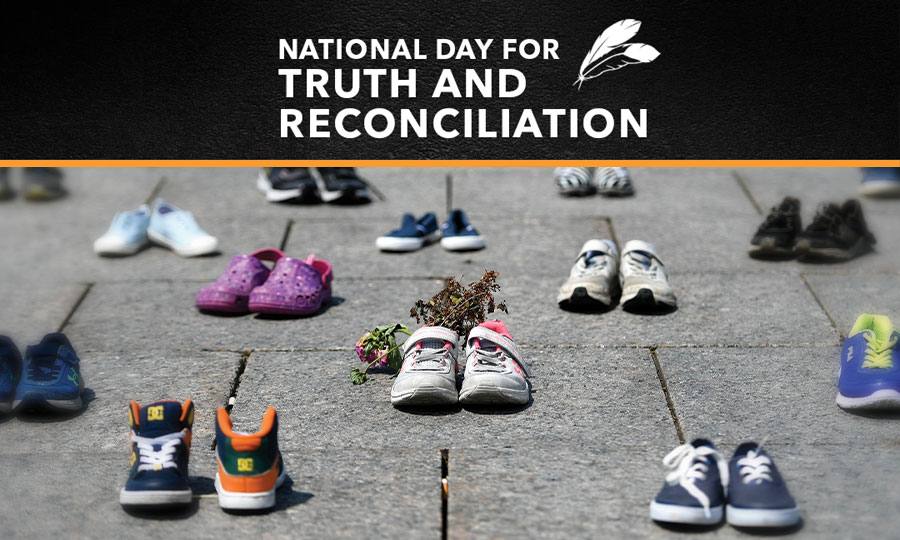Friday, September 30 marked the second National Day for Truth and Reconciliation.
And CPAC devoted a full day of special programming that allowed viewers to reflect on the experiences of Indigenous Peoples across the country and the long and continuing road to reconciliation.
In partnership with the National Centre for Truth and Reconciliation and APTN, CPAC aired the national commemorative gathering Remembering the Children: National Day for Truth and Reconciliation, taking place at LeBreton Flats Park in Ottawa.
The one-hour live broadcast honoured residential school survivors, their families, their communities, and all the children who never made it home. This one-of-a-kind event was led by children and residential school survivors.
Meanwhile, Prime Minister Justin Trudeau was among the participants in the "Beyond the Orange Shirt Story" event in Niagara Falls, Ont.
And Governor General Mary Simon delivered remarks as she hosted a gathering for school children at Rideau Hall in Ottawa
CPAC also showed special programming from its archives that takes viewers through key moments that have shaped Canada's reconciliation process.
That included highlights from the Truth and Reconciliation Commission's work, the release of the Commission's final report in 2015, and programming that explores the future of reconciliation.
This year's day occurred two months after Pope Francis visited Canada on a "penitential pilgrimage" of reconciliation that included an apology to residential school survivors and families.
And, seven years after the Truth and Reconciliation Commission's final report and calls to action.
Assembly of First Nations National Chief RoseAnne Archibald joined Michael Serapio this week for a discussion of how Canada is progressing at the implementation of those calls to action:
Crown-Indigenous Relations Minister Marc Miller also responded to concerns that the calls to action are taking to long to come to fruition:
Three years have also passed since the National Inquiry into Missing and Murdered Indigenous Women and Girls issued its own final report and calls for justice.
Commissioners had heard agonizing testimony from families and survivors about lives stolen - and other lives forever altered -- and the effect of residential schools.
Senator Michèle Audette was one of those commissioners. And this week she joined Michael Serapio on PrimeTime Politics to discuss what - and who - she would be thinking about on the National Day for Truth and Reconciliation. And -- how her experience as an MMIWG Inquiry commissioner has shaped her view of reconciliation.
A National Day for Truth and Reconciliation to honour Indigenous children who died while attending residential schools, survivors, families, and communities had been one of the TRC's Calls to Action.
The September 30 holiday became official in June 2021 with the passage of Bill C-5.
And a few months later Prime Minister Justin Trudeau took part in a Parliament Hill ceremony with survivors the evening before the first National Day for Truth and Reconciliation:
But there was backlash over Trudeau's decision to vacation with family to Tofino, B.C. on Sept. 30 itself instead of accepting invitations to public events, leading to an apology one week later:
"Travelling on September 30th was a mistake, and I regret it," says Prime Minister Justin Trudeau about his trip to Tofino, B.C., for a family vacation on Canada's first National Day for Truth and Reconciliation. #cdnpoli pic.twitter.com/YzVHmBtxvb
— CPAC (@CPAC_TV) October 6, 2021
Trudeau said he also apologized to Tk'emlúps te Secwépemc Chief Rosanne Casimir for not accepting two invitations to attend the First Nation's event in Kamloops, B.C., where more than 200 potential unmarked graves were discovered at the site of a former residential school.
That was followed by an in-person meeting in Kamloops. Casimir called the prime minister's visit an opportunity for positive steps and rectifying a mistake that caused “shock, anger and sorrow” in the community:
WATCH MORE
August 29: Survivors' Flag-Raising Ceremony
Prime Minister Justin Trudeau attended a ceremony on Parliament Hill for the raising of the survivors' flag, a symbol of remembrance to honour residential school survivors.
Also taking part were Claudette Commanda (Algonquin elder from Kitigan Zibi Anishinabeg), Dylan Whiteduck (chief of the Kitigan Zibi Anishinabeg), Stephanie Scott (executive director of the National Centre for Truth and Reconciliation), and residential school survivors Eugene Arcand, Levinia Brown, and Jimmy Durocher.
Following the ceremony, Scott, Brown, and Arcand joined federal ministers Marc Miller (Crown-Indigenous relations) and Dan Vandal (northern affairs) for a media availability. (no interpretation)
June 8: Special Interlocutor on Residential School Unmarked Graves
The federal government appointed Kimberly Murray as independent special interlocutor for unmarked graves and burial sites associated with former residential schools, working with Indigenous communities on creating a federal legal framework to ensure the proper treatment and protection of these graves and burial sites.
A member of the Kanehsatake Mohawk Nation, Murray is a lawyer and the former executive director of the Truth and Reconciliation Commission (TRC).
She will deliver an interim report after her first year in the role, and a final report at the end of the two years.
June 6: National Indigenous Economic Strategy
Representatives from Indigenous organizations officially launched the National Indigenous Economic Strategy for Canada.
Developed exclusively by national Indigenous leaders and institutions, the plan has four strategic pathways in the areas of people, lands, infrastructure and finance. It also includes 107 calls to economic prosperity.
The strategy is a blueprint that focuses on the economic aspects of reconciliation, by reducing poverty among Indigenous peoples and creating a more prosperity for the country at large.
Health Support Programs
National Residential School Crisis Line: 1-866-925-4419
Missing and Murdered Indigenous Women and Girls Crisis Line: 1-844-413-6649
Hope for Wellness Help Line for First Nations, Inuit and Métis seeking immediate emotional support: 1-855-242-3310




